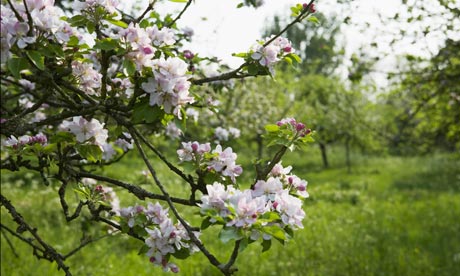
Greetings, reviewers, and thanks for your thoughts this week. Reviews for First Book Award-nominated books have continued to dominate the airwaves, but blog readers will have seen those popping up over the last few days, so I'm going to concentrate on the best of the rest here.
I was initially drawn to Friederike Knabe's review of Peter Hobbs' In the Orchard, the Swallows for personal reasons. One of the books I'm most haunted by is one whose title I can't recall: a picturebook in which a young girl is too ill, over winter, to play in the snow, but goes to visit her aunt in springtime and experiences the tumbling blossom in her apple orchard as a substitute. Friederike's review, which begins "A man returns to the orchard of his childhood …" called this immediately to mind. "Hobbs's novella," Friederike explains, "captures the reader from the first sentences … Very quickly we sense that during the intervening years, between childhood and now, much has happened to the young man … The swallows symbolize the freedom he has lost and his undiminished yearning for it." I'm always up for a bit of Proustian poignancy, so this sounds right up my alley. Meanwhile, if anyone can satisfy my undiminished yearning for the picturebook of my childhood, I'd be very grateful - I've been trying to remember what it's called for years.
Domi14's review of Vanessa Gebble's The Coward's Tale pointed me towards another piece of vicarious nostalgia (apologies: it's been a bit of a solipsistic week). I grew up in Newcastle in the early 1980s, when the city and the region was in the grip of the miners' strike; consequently, I'm a right sucker for that very specific sub-genre of mining tales (to the extent that I named my son after a character in Frederick Grice's The Bonnie Pit Laddie). The Coward's Tale sounds like a fine addition to the canon; it is, says Domi14, "a beautiful book ... set in a Welsh mining community living with the legacy of the collapse of the Kindly Light pit … What is remarkable about it is not the plot, but the voice of the writer and the world that she has created. Within minutes, one is wrapped up within the book and the story unfolds delicately and wonderfully in front of you, steeped both in place and character. It is quite simply a stunning debut novel."
And finally, this made me laugh. "When I saw that Shades of Grey had finally become a bestseller, I wasn't at all surprised," writes prosaic, " … until I realised that the title had been pinched. Deadly Shades of Grey has been about since 2007, the fourth of the Grey series was published last year. The Grey family are Sarah Grey and her daughter Clarrie Hunter. Clarrie is an artist (like the author, Mai Griffin) and the book is about her gradual discovery that, like her mother, she is subject to psychic flashes … What I like most about the book, however, is that it is not only written in English, the English is good. The grammar is correct and the story loses nothing by being well written ... such a nice change." Quite.
If we've mentioned your review, mail me on sarah.crown@theguardian.com and I'll send you something excellent from our cupboards. More next week; thanks again, meanwhile.

